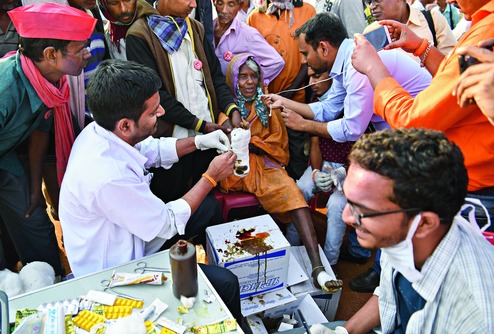
New Delhi: For Indranil Mukherjee, the AFP photojournalist who clicked Sakku Bai's blistered foot on Monday in Mumbai, "it's one of those photos that will stay with me for life".
Manashree Pathak, who reports for the Marathi TV channel ABP Majha, found the 62-year-old peasant's wound so bad that the journalist felt Sakku Bai should've been admitted to hospital.
Information pieced through such accounts a day after the "Long March" of farmers ended in Mumbai suggested that Sakku Bai, whose photograph was carried by this newspaper and others, had walked six days barefoot over metalled roads whose tar melted in the 40-degree temperatures and scalded her soles.
The Telegraph could not speak to Sakku Bai on Monday as some activists who are acquainted with her said they could not contact anyone carrying a phone in her group. Sources in the CPM, whose farmers' wing had organised the march, said the forest villages were remote and a party member could be sent to find her only on Wednesday morning.
"She had lost her slippers during a stopover. At places where slippers were distributed (by ordinary people living along the 180km route), she and her group were too frail to push their way through the crowd to a pair," said Pathak, the TV journalist who had found Sakku Bai under a tent in Mumbai's Azad Maidan on Monday afternoon.
Sakku Bai's wounds were caused by burst blisters, lacerations and the skin coming off when she tried to remove the tar that had stuck to her feet. "When she tried to wash the tar off, she got an infection," Pathak said.
Her wounds were dressed thrice - once near Thane by an ambulance sent by civic authorities and twice at the Azad Maidan tent, near which the Shiv Sena organised four ambulances and health camps.
"But as she kept walking barefoot, the bandages and blisters opened up," Pathak said.
The CPM-backed All India Kisan Sabha's march was for tillers' right to forestland, unconditional coverage of the government's loan waiver scheme, better prices for farm produce and other demands. One of these was a Rs 5,000 monthly pension for all aged peasants - which is the one that drew Sakku Bai out of her forest village in Nashik's Dindori taluka to join the marchers.
"She hadn't a husband and said her daughter had been married off. She told me she was a landless peasant who found work only after the rains, and survived on forest produce the rest of the year," Pathak said.
"She receives a Rs 600 pension under the Sanjay Gandhi Niradhar Anudan Yojana (for destitute women and transgender people). She joined the march to demand a higher pension."
The Maharashtra government has not accepted the demand for a Rs 5,000 pension but has agreed to increase aid under the Yojana for tribal women with serious health issues. Some fingers of Sakku Bai - who spoke with a tribal accent, Pathak said - are deformed and paralysed. It is not clear whether the condition would meet the criterion for the aid.
Pathak said the women peasants, who received farm wages of Rs 50 to Rs 100 a day, were more agitated than the men who were paid Rs 200 to Rs 300.
"The women told me they had to go home after this rally and take loans of Rs 200 to Rs 300 to buy groceries, as they had not earned for the past week, and immediately start working to repay the debt. The men said they would rest for a couple of days."
Sakku Bai was part of a group of supporters of the CPM's Kalwan MLA, Jiva Pandu Gavit, who had marched with them from Nashik. Most of the 40,000-odd peasants were from Nashik, home to the Mahadeo Koli and Kokana tribal folk. Gavit is a Kokana.
The peasants had walked mostly during the day and would have reached and marched through Mumbai sometime during Monday. Worried that this could cause traffic jams on a day the Senior Secondary Certificate exam was scheduled, the government asked them to walk through Sunday night so they could reach Mumbai by early morning. They complied.
"The marchers are very poor. Even those who had footwear wore rubber or plastic slippers that came apart along the way," Gavit, a seven-time MLA, told The Telegraph over the phone.
"On our request, district health officials and civil surgeons sent ambulances to treat the ailing along the route. One comrade had to undergo surgery in Mumbai after his stomach ulcer aggravated. Several city dwellers offered fruits and even footwear to the marchers."
Mukherjee, a photojournalist with the news agency AFP, clicked Sakku Bai's foot on Monday at a first-aid post set up by the Shiv Sena on Azad Maidan.
"It's one of those photos that will stay with me for life. She was given painkillers and antibiotics. She did not even flinch when the wound was dressed and began to walk immediately after treatment," Mukherjee said.
Pathak and video journalist Rupesh bought Sakku Bai a pair of soft-soled slippers from a nearby shop. "Her wounds were so bad that she should've been admitted to hospital," Pathak said.











